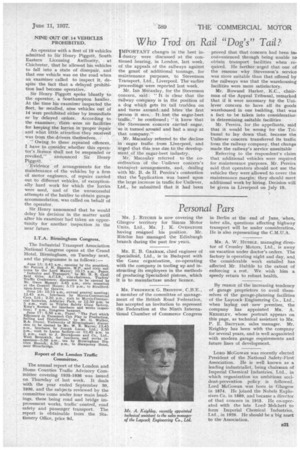Who Trod on Rail "Dog's" Tail? , I MPORTANT changes in the
Page 37

If you've noticed an error in this article please click here to report it so we can fix it.
beet industry were discussed at the continued hearing, in London, last week, of the appeals of the railways against the grant of additional tonnage, for maintenance purposes, to Stevenson Transport, Ltd., Liverpool. The earlier proceedings were reported last week.
Mr. Ian Macaulay, for the Stevenson concern, said: " It is clear that the railway company is in the position of a dog which gets its tail trodden on and turns around and bites the first person it sees. It _lost the sugar-beet traffic," he continued; "it knew that the Stevenson concern carried sugar, so it turned around and had a snap at that company." , Mr. Macaulay referred to the decline in sugar traffic from Liverpool, and :urged that this was due to the development .of the sugar-beet industry.
Mr: Macaulay referred to the coordination of the Unilever concern's transport arrangements, and, dealing with Mr. B. de H. Pereira's contention that the °application was based upon the large increase in traffic for Unilever. Ltd., he submitted that it had been
-proved that that concern had been inconvenienced through being unable to obtain transport facilities when required. He further, urged that one of the reasons why Stevenson's service was more suitable than that offered by the railways was that the warehousing facilities were more satisfactory.
Mr. Rowand Harker, ICC., chairman of the Appeal Tribunal, remarked that if it were necessary for the Unilever concern to have all its goods warehoused in one building, that was a fact to be taken into consideratior• in determining suitable facilities
Mr. Pereira, for the appellants, said that it would be wrong for the Tribunal to lay. down that, because the Unilever concern transferred its traffic from the railway company; that change made the railway's service unsuitable
Referring to the fespondent's claim that additional vehicles were required for maintenance purposes, Mr. Pereira said that operators should not use the vehicles they were allowed to cover the maintenance margin; they should meet additional work by hiring. Decision will be given in Liverpool on July 19.






























































































